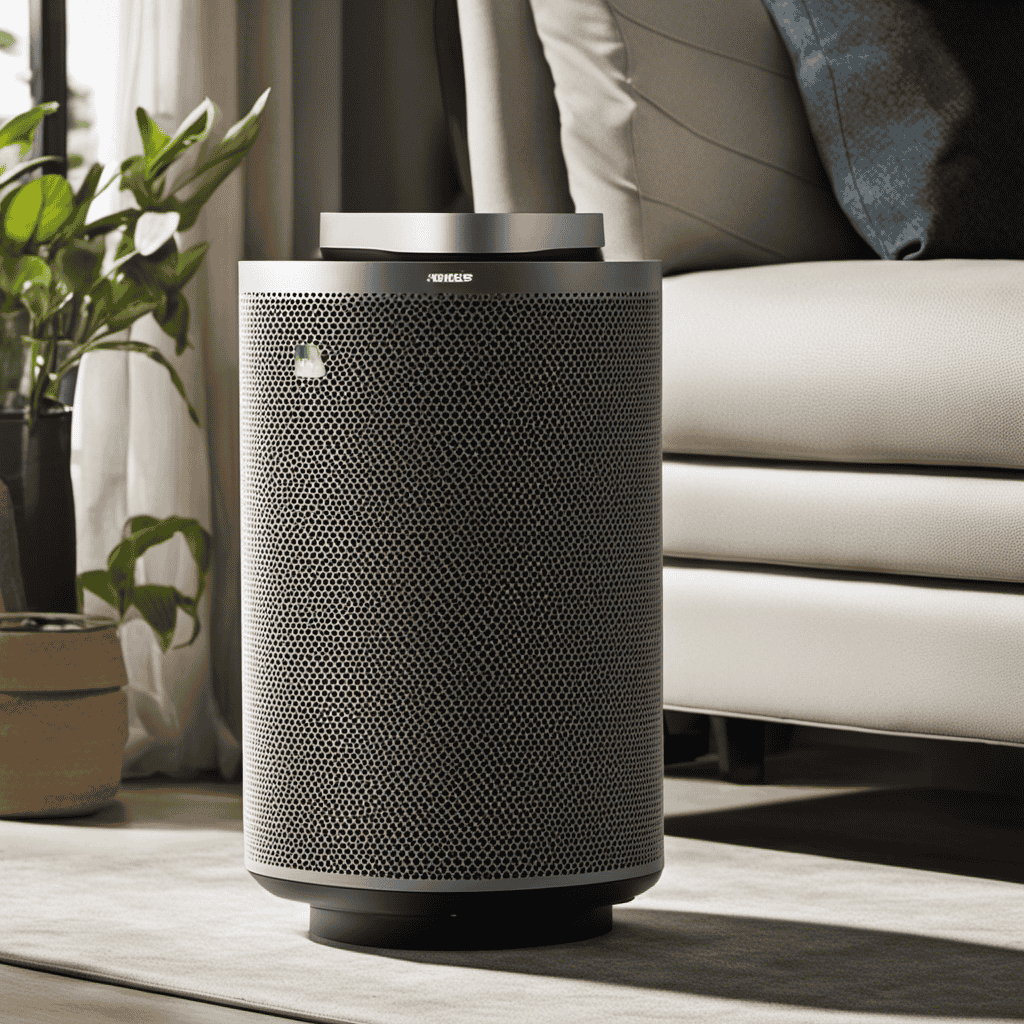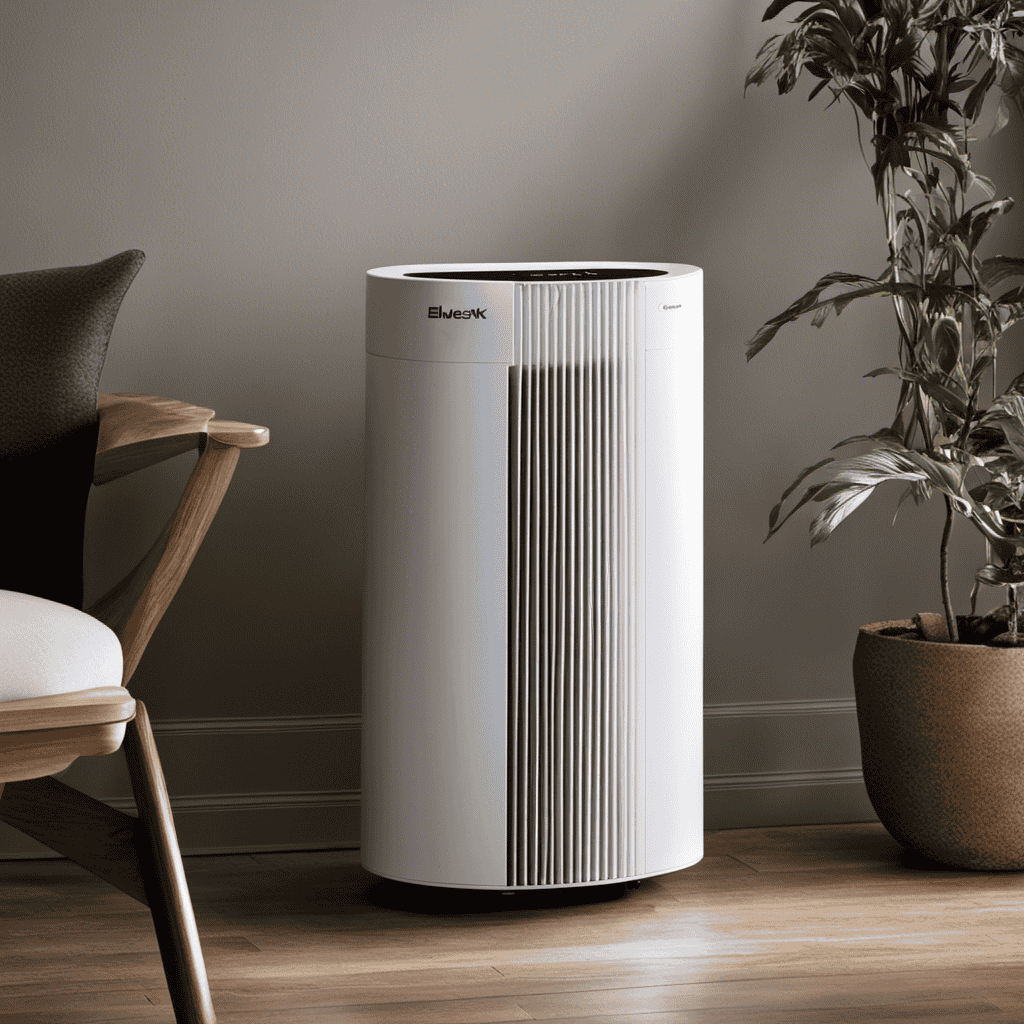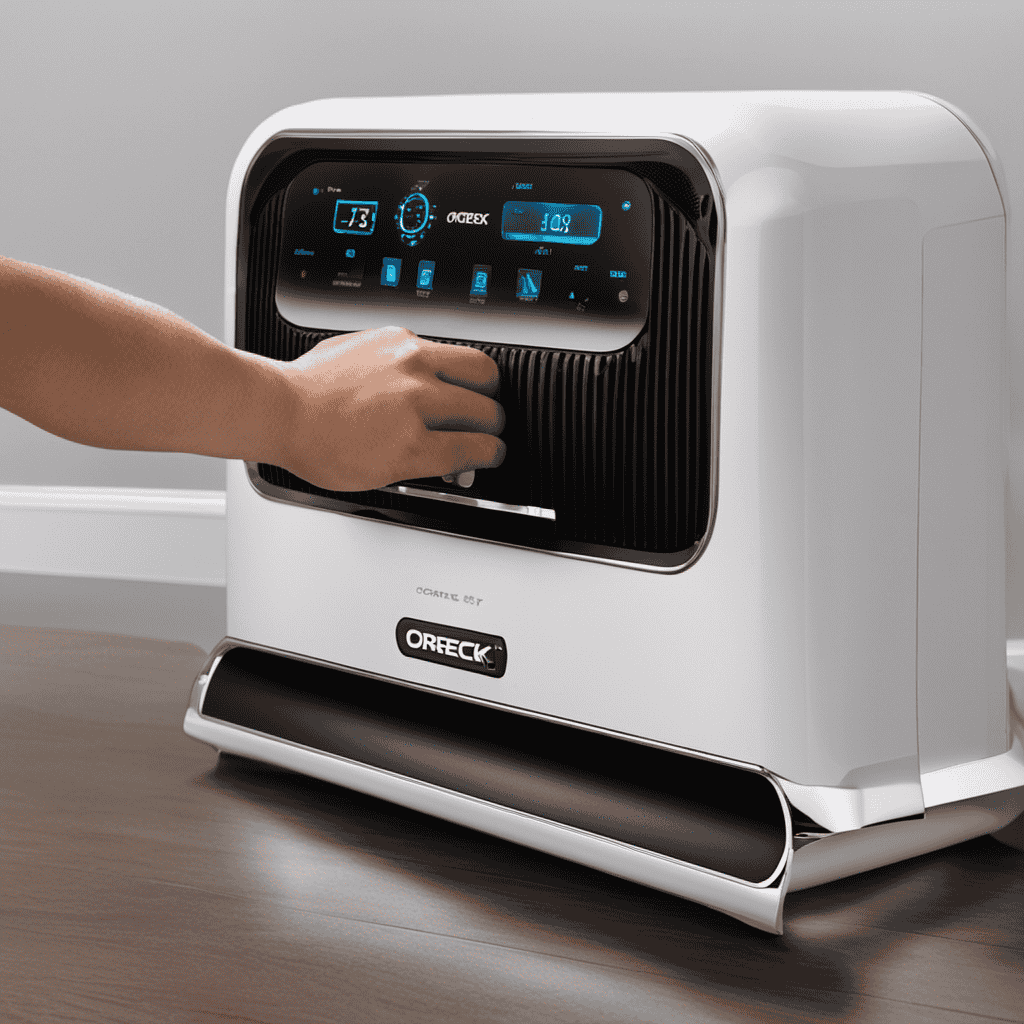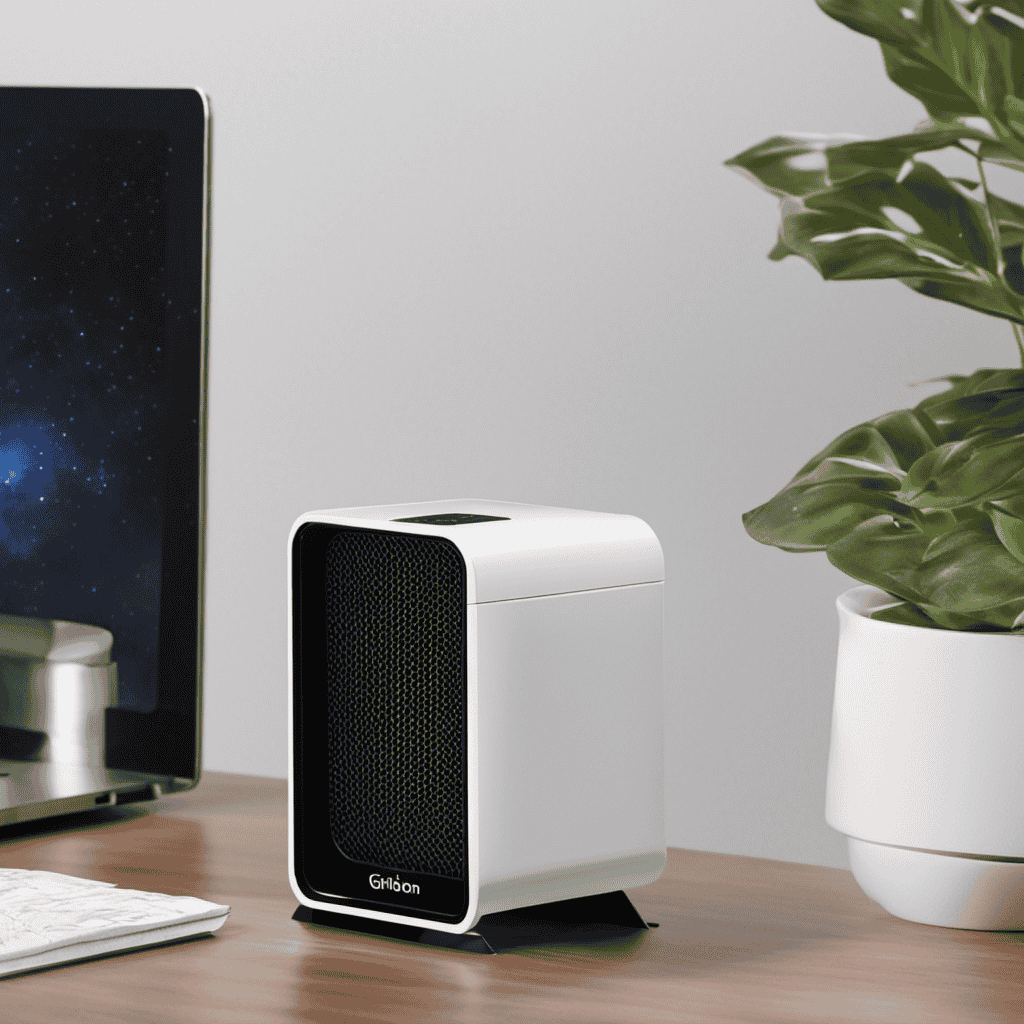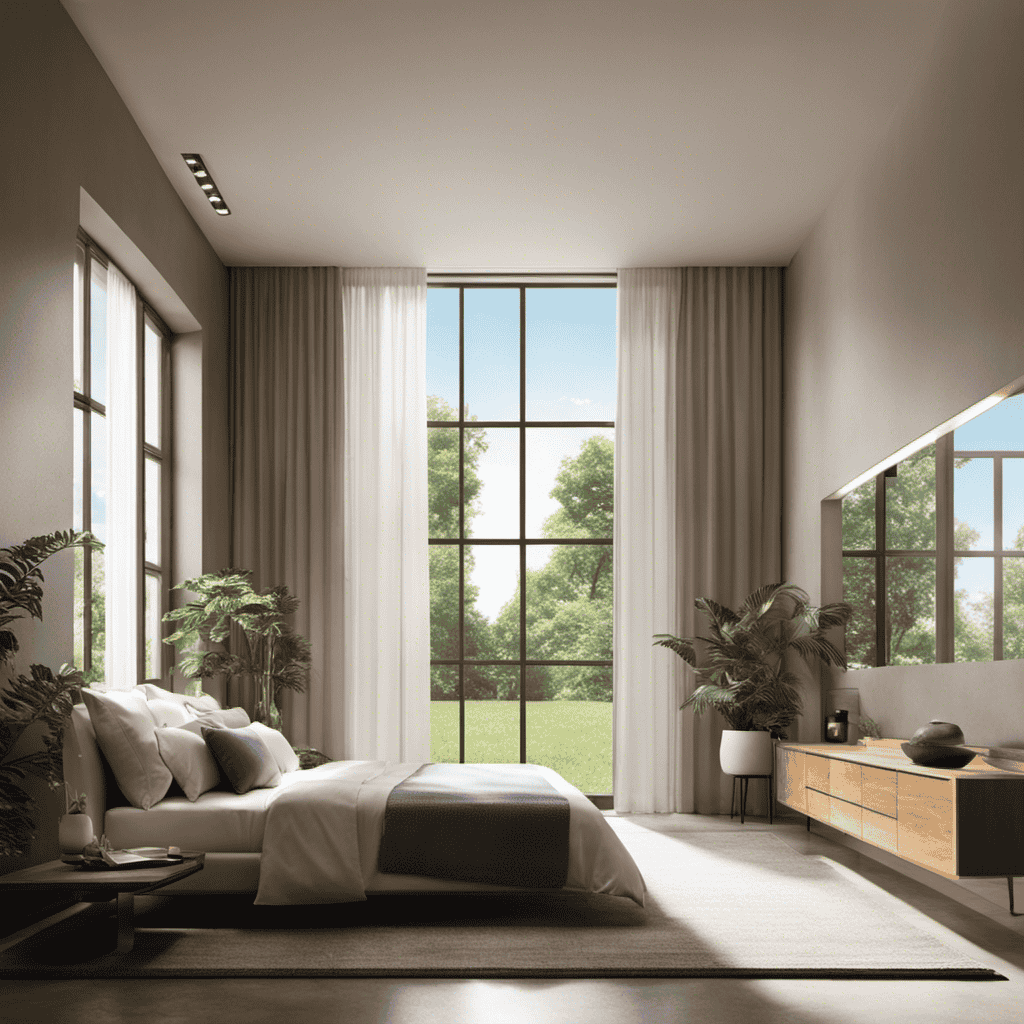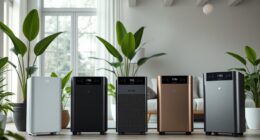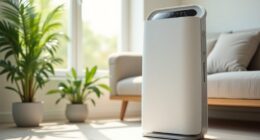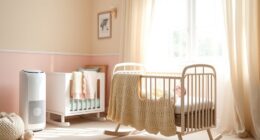As a homeowner who cares about the air I breathe, I was shocked to discover that indoor air can be up to five times more contaminated than outdoor air. This concerning fact motivated me to explore the realm of air purifiers.
In this article, we will explore the question: does it matter which air purifier I have or just the filter? By examining different types of air purifiers, factors to consider, and the importance of air purifier features, we will uncover the truth behind this common dilemma.
Key Takeaways
- The effectiveness of an air purifier is determined by the filter, so choosing the right filter is crucial.
- Different filter types have varying levels of effectiveness in removing pollutants from the air.
- The size of the room or space should be taken into account when selecting an air purifier.
- Considering factors such as noise levels, energy efficiency, and maintenance requirements is important in choosing the right air purifier.
Types of Air Purifiers
It doesn’t matter which air purifier I have, as long as it has the right filter.
When it comes to air purifiers, there are various brands available in the market. However, the key factor to consider is the efficiency of the filter used in the air purifier. Different brands may offer different features and designs, but ultimately, it is the filter that determines the effectiveness of the purifier.
In terms of cost comparison, it is important to note that the price of air purifiers can vary significantly across brands. Higher-end brands may offer advanced technology and additional features, which can result in a higher price point. On the other hand, there are more affordable brands that still provide good filtration capabilities.
To make an informed decision, it is crucial to evaluate the performance and efficiency of the filters used in different air purifiers, rather than solely focusing on the brand name or cost. Ultimately, the right filter is what truly matters for achieving clean and fresh indoor air.
Factors to Consider When Choosing an Air Purifier
When choosing an air purifier, it’s important to consider the type of filter used. Different filter types have varying levels of effectiveness in removing pollutants from the air, so understanding the importance of filter type is crucial in selecting the right purifier for your needs.
Additionally, the size of the room or space you intend to use the air purifier in should also be taken into account. Certain purifiers are better suited for larger or smaller areas based on their airflow capacity and coverage.
Filter Type Importance
The type of filter you choose for your air purifier can greatly impact its effectiveness. When it comes to air quality improvement methods, filter type comparison is crucial. Different filter types have varying capabilities in capturing and eliminating airborne pollutants.
HEPA filters, for example, are considered the gold standard in air purification as they can remove up to 99.97% of particles as small as 0.3 microns in size. Activated carbon filters are effective in eliminating odors and volatile organic compounds (VOCs). Electrostatic filters, on the other hand, use an electric charge to attract and trap particles.
It is important to choose a filter type that best suits your specific needs and addresses the particular pollutants present in your indoor environment. Understanding the strengths and limitations of each filter type is essential in ensuring optimal air purification.
Now, let’s move on to discussing the suitability of air purifiers for different room sizes.
Room Size Suitability
Now let’s talk about how different room sizes can affect the suitability of air purifiers.
When choosing an air purifier, it is important to consider the limitations of the room size. Air purifiers are designed to clean the air within a certain square footage, and using one that is too small for a larger room will result in ineffective air purification.
On the other hand, using an air purifier that is too large for a smaller room may lead to excessive noise levels and unnecessary energy consumption. Therefore, it is crucial to select an air purifier that is appropriate for the size of the room to ensure optimal air purification without compromising noise level considerations.
Now that we understand the importance of room size, let’s delve into the topic of understanding air purifier filters.
Understanding Air Purifier Filters
Understanding air purifier filters is crucial in determining the effectiveness of the device. The filter is the key component that traps and removes airborne particles, such as dust, pollen, and pet dander, from the air.
Here are two important factors to consider when it comes to air purifier filters:
-
Filter Type:
-
HEPA (High-Efficiency Particulate Air) filters are widely considered the gold standard in air purification. They capture 99.97% of particles as small as 0.3 microns.
-
Activated carbon filters are effective in removing odors, smoke, and chemicals from the air.
-
Filter Maintenance:
-
Regularly replacing the filter is essential for optimal performance. The manufacturer’s instructions will provide guidance on how often to change the filter.
-
Some air purifiers have filter replacement indicators that notify you when it’s time to replace the filter.
Importance of Air Purifier Features
Make sure to consider the importance of different features when choosing an air purifier for your specific needs. While the filter is crucial in capturing and removing pollutants from the air, other features can greatly enhance the performance and usability of the device. Two key features to consider are the air purifier noise level and energy efficiency.
An air purifier with low noise levels can be especially important if you plan to use it in spaces where silence is essential, such as bedrooms or offices. Look for models with noise levels below 50 decibels for a peaceful environment.
Energy efficiency is another important feature to consider. Energy-efficient air purifiers consume less electricity, resulting in lower energy bills and a smaller environmental footprint. When choosing an air purifier, look for models with Energy Star certification, which ensures that the device meets strict energy efficiency guidelines.
Here is a table summarizing the noise level and energy efficiency of different air purifiers:
| Air Purifier Model | Noise Level (dB) | Energy Efficiency |
|---|---|---|
| Model A | 40 | Energy Star |
| Model B | 50 | Not Energy Star |
| Model C | 35 | Energy Star |
| Model D | 45 | Energy Star |
| Model E | 55 | Not Energy Star |
Consider these features alongside the filter quality when selecting an air purifier to ensure it meets your specific needs for noise level and energy efficiency.
Common Misconceptions About Air Purifiers
When it comes to the effectiveness of filters versus purifiers, it is important to consider the data and evidence available.
Many people believe that air purifiers are more effective at removing pollutants than filters alone. However, research has shown that while air purifiers can be effective in certain situations, their overall effectiveness may not be as significant as some may think.
In fact, there are common misconceptions about air purifiers that need to be debunked in order to make informed decisions about indoor air quality.
Filter Vs. Purifier Effectiveness
It’s important to consider the effectiveness of the filter and purifier in your air purifier. When evaluating the cost effectiveness of an air purifier, it’s crucial to assess the performance of both the filter and purifier components. Here are two key factors to consider:
-
Filter Efficiency:
-
Look for a filter that has a high efficiency rating, such as HEPA filters which can remove up to 99.97% of particles as small as 0.3 microns.
-
Consider the lifespan of the filter and the cost of replacement filters to determine long-term cost effectiveness.
-
Purifier Noise Levels:
-
Check the noise levels produced by the purifier, particularly if you plan to use it in a bedroom or office setting.
-
Look for purifiers with noise levels below 50 decibels for undisturbed sleep or work.
Considering these factors will help you choose an air purifier that is both cost effective and suitable for your specific needs.
Now, let’s explore common misconceptions about air purifiers.
Air Purifiers Debunked
To debunk common misconceptions, let’s take a closer look at how air purifiers actually work.
Air purifiers are designed to improve indoor air quality by removing pollutants and allergens from the air. Contrary to popular belief, air purifiers do more than just filter the air.
They use a combination of filtration technologies, such as HEPA filters, activated carbon filters, and electrostatic precipitators, to capture and neutralize particles, gases, and odors. These devices have been scientifically proven to reduce the concentration of airborne contaminants, which can have a significant impact on respiratory health and overall well-being.
However, it is important to note that air purifiers are not a cure-all solution and should be used in conjunction with other strategies to maintain a healthy indoor environment.
Now that we understand the benefits of air purifiers, let’s explore how to maintain and maximize their efficiency.
How to Maintain and Maximize Air Purifier Efficiency
Regular maintenance and proper usage of an air purifier can help maximize its efficiency. Here are some tips for cleaning and maintaining your air purifier:
-
Cleaning:
-
Remove and clean the pre-filter regularly to remove larger particles and extend the life of the main filter.
-
Clean the main filter according to the manufacturer’s instructions. This may involve vacuuming, rinsing, or replacing the filter.
-
Usage:
-
Keep the air purifier running continuously for optimal air cleaning.
-
Position the air purifier in a central location for maximum coverage.
-
Avoid placing the air purifier near obstacles or furniture that can obstruct airflow.
-
Close doors and windows to prevent outdoor pollutants from entering your space.
Frequently Asked Questions
How Often Should I Replace the Filter in My Air Purifier?
Replacing the filter in your air purifier is an essential part of air purifier maintenance. It ensures that your purifier continues to effectively remove pollutants, improving indoor air quality and providing the benefits of clean air.
Can an Air Purifier Help With Allergies and Asthma?
An air purifier can significantly improve indoor air quality by removing allergens and irritants, reducing symptoms of allergies and asthma. Its effectiveness depends on the type of purifier and its filtration system.
Are There Any Safety Concerns With Using an Air Purifier?
There are potential health risks associated with using an air purifier, so it is important to consider safety precautions and proper air purifier maintenance. These factors can impact the overall effectiveness of the device.
Can an Air Purifier Eliminate Odors From Cooking or Pets?
It’s important to consider both the air purifier and the filter when addressing odors. The effectiveness of an air purifier in eliminating cooking or pet odors depends on its design, filter type, and airflow capacity.
Do I Need to Run My Air Purifier All the Time, or Only When I’m at Home?
Running an air purifier all the time, even when I’m not home, can improve indoor air quality while I sleep. However, it’s essential to consider energy consumption. Some air purifiers consume more energy than others, so choose wisely.
Conclusion
In conclusion, when it comes to air purifiers, both the type and the filter matter. Just having a high-quality filter is not enough if the air purifier itself is not designed to effectively circulate and purify the air in your space.
It’s like having a powerful engine in a car with a broken transmission – it won’t perform optimally. So, consider both the filter and the design of the air purifier when making your choice.
Remember, a well-engineered air purifier with a top-notch filter is the winning combination for clean and healthy indoor air.
